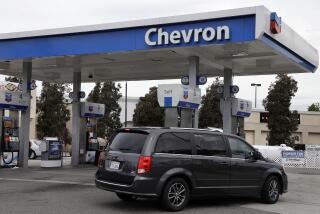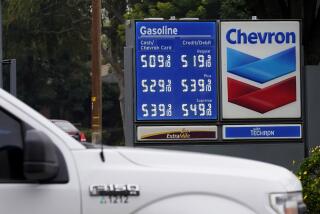Tepid Results at Chevron Cut Value of Offer
- Share via
Chevron Corp.’s standing in the battle for Unocal Corp. took a hit Friday when investors reacted to a tepid earnings report from the nation’s No. 2 oil company by driving its stock price down and lopping $160 million off the value of its takeover bid.
Unocal, meanwhile, disclosed in a regulatory filing that its top eight executives would collect a buyout package that could be worth almost $109 million. The total amount of the award, which would be paid by Chevron or rival bidder CNOOC Ltd. of China, depends on the final price of the Unocal acquisition.
The value of Chevron’s cash-and-stock bid fluctuates with the price of its shares. Analysts said the San Ramon, Calif.-based oil company had needed to post strong second-quarter results to give its stock a pop -- and boost the value of its Unocal bid, which already was lagging behind CNOOC’s.
Even though Chevron’s net income of $1.76 a share beat Wall Street estimates, investors were disappointed that it didn’t do better given the blowout results many oil companies have reported this year.
Chevron’s stock slid 93 cents to $58.01, trimming the value of its offer to $63.45 per Unocal share, or $17.28 billion, from $64.02 a share, or $17.44 billion, based on Thursday’s closing price.
CNOOC, whose parent is government-controlled China National Offshore Oil Corp., last month offered to buy Unocal for $18.5 billion, or $67 a share, kicking up a storm of criticism in Washington. CNOOC has resisted pressure to raise its bid, which was rejected by Unocal as being too low given the extra political risk and the regulatory delays a deal probably would entail.
With Unocal shareholders scheduled to vote Aug. 10 on Chevron’s offer, CNOOC must decide in the next few days whether to up its bid.
Wall Street clearly thinks there’s a chance that could happen. Although Unocal’s stock fell 35 cents to $64.85 after it, too, released earnings Friday, the closing price was still $1.40 above Chevron’s offer.
“CNOOC isn’t going quietly into that good night,” said Jeb Armstrong, an oil analyst at Argus Research Corp. “The question is, how high is CNOOC willing to go?”
Media reports out of Asia, citing unnamed sources, have been split on whether CNOOC would increase its offer or abandon its pursuit of Unocal. A CNOOC spokesman in China said the company stood by its original offer and was still engaged in the bidding for Unocal. On Friday, CNOOC shares soared in New York trading, jumping $4.61, or more than 7%, to $69.81.
Meanwhile, Unocal and Chevron executives are visiting some of Unocal’s largest shareholders in the coming days to drum up support for Chevron’s bid.
Jason Putman, a managing director of Victory Capital Management, which owns more than 7 million Unocal shares, said he wasn’t impressed with Chevron’s offer and hoped to see a counter bid from CNOOC.
“If a new offer is coming from CNOOC, it’s probably coming Monday or Tuesday,” Putman said. He said the Chevron deal was not in trouble, “but the stock price puts you in a predicament here. The Chevron offer is below Unocal’s stock price.”
Against this backdrop, Chevron posted second-quarter net income of $3.68 billion, a decline of 11% from a year ago, when profit was boosted by one-time items. Revenue rose 26% to $48.3 billion for the three months ended June 30, bolstered by higher prices for the oil and natural gas the company produces.
Even though it beat profit estimates, Chevron reported a 6% drop in production from a year ago -- reflecting a troubling trend for the company.
“They just haven’t been able to effectively replace [oil] reserves,” said John Leiviska, director of corporate research at bond fund manager Advantus Capital Management Inc. “If you can’t go out and develop reserves, then you go out and buy them,” he added, alluding to the offer for Unocal.
Meanwhile, Unocal reported that its second-quarter net income rose 39% to $475 million, or $1.73 a share. Excluding one-time items, profit amounted to $1.77 a share, well above analysts’ estimates of $1.63.
The company’s second-quarter revenue rose 19% to $2.21 billion while its output of oil and natural gas jumped 14% over the same quarter in 2004. Unocal also made itself more attractive to an acquirer by boosting its cash balance and by reducing its debt by $190 million to $2.54 billion as of June 30.
Unocal on Friday also said it had reached a settlement with a group of shareholders who had challenged the Chevron acquisition in court. Terms of the deal were not disclosed, but Unocal said it agreed to release more information about the buyout negotiations and other matters as part of the settlement.
Unocal’s added disclosures, filed with the Securities and Exchange Commission, for the first time provided a tally of the bonuses and other compensation to be paid to the company’s top officers as part of Unocal’s change-of-control plan. Assuming a deal worth $65 a share, Unocal’s top eight executives would get a total of $108.7 million in cash, stock and other benefits, Unocal estimated.
Compensation expert Alan Johnson said such change-of-control payouts were common, but he criticized them as “the single most egregious thing in executive compensation.”
*
Times staff writer Don Lee contributed to this report.
More to Read
Inside the business of entertainment
The Wide Shot brings you news, analysis and insights on everything from streaming wars to production — and what it all means for the future.
You may occasionally receive promotional content from the Los Angeles Times.










